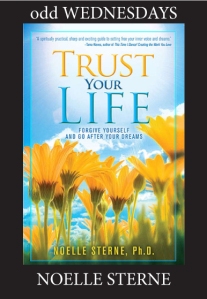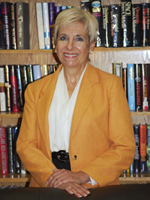 Ever since I discovered Julia Cameron’s The Artist’s Way, first published in 1992, I’ve been intrigued and bolstered by the relationship of creativity to spirituality. Cameron’s subtitle proclaims the connection without embarrassment or rationale: A Spiritual Path to Higher Creativity. When the book first came out, I was an aspiring writer with little confidence and recurring blocks as huge as a big-box warehouse. I clung to the book like a missal. My rosary was a chapter a week, my devotions Cameron’s rigorous end-of-chapter “tasks” and “check-ins,” and my confessional her daily “Morning Pages.”
Ever since I discovered Julia Cameron’s The Artist’s Way, first published in 1992, I’ve been intrigued and bolstered by the relationship of creativity to spirituality. Cameron’s subtitle proclaims the connection without embarrassment or rationale: A Spiritual Path to Higher Creativity. When the book first came out, I was an aspiring writer with little confidence and recurring blocks as huge as a big-box warehouse. I clung to the book like a missal. My rosary was a chapter a week, my devotions Cameron’s rigorous end-of-chapter “tasks” and “check-ins,” and my confessional her daily “Morning Pages.”
And, true to St. Cameron’s prophecy, after I faithfully did the exercises and Morning Pages for about two years, I began to publish.
As heady as this yearned-for outcome was, I realized that equally valuable and profound were Cameron’s passages on spirituality. Granted, the greatest lessons for “blocked creatives,” as Cameron calls us (p. 33), may be in her own lyrical reflections, candid examples, and vivid descriptions of block-making and block-crumbling issues and her tough restorative exercises that prompt you to shout back at all the naysayers within and without.
Nevertheless, Cameron’s radical foundation, again declared in that subhead, is this: Creativity comes from spirituality. And she offers principles and prayers throughout in support (for example, the “Basic Principles” on p. 3; the “Affirmations” on p. 146; and, on the very last page, her poem “An Artist’s Prayer,” p. 211).
So, as a belated homage to Cameron, in admitted evangelizing I continue to explore intersections of writing/creativity and spirituality. If you don’t believe they exist, fine. If you think they’re BS, fine. If you’re provoked to slam your laptop shut or zip up your Ipad case, fine.
Despite my early enthusiasm, I reacted in all these ways until I asked myself a few questions: What’s to lose? An intellectual superiority? A sense of control? An a-spiritual stance?
And a few more: How bad would losing these be? An affront to my ego? Loss of pride in the realism of concrete actualities? Could I possibly learn something? Could it possibly benefit my writing?
With my grudging affirmatives to all these questions, I ask you to consider the topic. An acknowledgment of spirituality (and we shouldn’t leave out God or your preferred epithet), may, to your surprise, help your writing, as it did mine. A reluctant recognition may stretch your belief system, puncture your pragmatic stand, or compromise your principles, but in the end it really can’t hurt.
When I first conceded the relationship of creativity to spirituality, I was helped to find my confidence and voice, to work in more sustained sessions, to keep promises to myself for starting and completing specific writing sessions, and to (astoundingly) increase my overall productivity. And much more . . . .
I am convinced the relationship between creativity and spirituality is essential. As we consciously develop our spirituality we become better writers, happier writers (if there is such a thing), more powerful writers, and writers truer to ourselves. No, you don’t have to kneel at the calls to prayer, show up at church, or weekly fast from burgers. Our worship is our work and ourselves.
 Author, editor, writing coach, and spiritual counselor, Noelle Sterne writes fiction and nonfiction, having published over 300 pieces in print and online venues, including Writer’s Digest, The Writer, ReadLearnWrite, Women on Writing, Transormation Magazine, 11.11, and Unity booklets. Her monthly column, “Bloom Where You’re Writing,” appears in Coffeehouse for Writers. With a Ph.D. from Columbia University, for over 28 years Noelle has helped doctoral candidates complete their dissertations (finally), with a psychological-spiritual handbook in progress. In her book Trust Your Life: Forgive Yourself and Go After Your Dreams (Unity Books; one of ten best 2011 ebooks), she draws examples from her practice and other aspects of life to help writers and others release regrets, relabel their past, and reach their lifelong yearnings. See Noelle’s website: www.trustyourlifenow.com. With Trust Your Life, Noelle appears in the Unity Books 2013 “Summer of Self-Discovery” on Goodreads with two other authors of positive messages for discussions and free webcasts: http://www.goodreads.com/group/show/100799-unity-books
Author, editor, writing coach, and spiritual counselor, Noelle Sterne writes fiction and nonfiction, having published over 300 pieces in print and online venues, including Writer’s Digest, The Writer, ReadLearnWrite, Women on Writing, Transormation Magazine, 11.11, and Unity booklets. Her monthly column, “Bloom Where You’re Writing,” appears in Coffeehouse for Writers. With a Ph.D. from Columbia University, for over 28 years Noelle has helped doctoral candidates complete their dissertations (finally), with a psychological-spiritual handbook in progress. In her book Trust Your Life: Forgive Yourself and Go After Your Dreams (Unity Books; one of ten best 2011 ebooks), she draws examples from her practice and other aspects of life to help writers and others release regrets, relabel their past, and reach their lifelong yearnings. See Noelle’s website: www.trustyourlifenow.com. With Trust Your Life, Noelle appears in the Unity Books 2013 “Summer of Self-Discovery” on Goodreads with two other authors of positive messages for discussions and free webcasts: http://www.goodreads.com/group/show/100799-unity-books

I endorse what you say about Julia Cameron’s excellent guide, The Artist’s Way, and its value in prompting the gradual awakening of our creativity, in writing or some other art form.
Clearly, Cameron works for you!
As for the brave assertion that creativity comes from spirituality, I believe that’s one all writers must make, explicitly or implicitly, some time after they’ve put in their hours of “blood, sweat and tears” in mastering their craft, put their work out for readers to find and gathered a readership.
Without necessarily stating it out loud, we fiction writers (for example) have to acknowledge that whatever struggles and reverses we put our characters through in the course of our stories, defeat and disappointment are never the end. They’re the means, not the end.
As a fiction writer. I’ll stick my neck out and say that the first banner we writers ought to unfurl, when we’ve found our way, is the one that proclaims: Pessimism isn’t reality, optimism is.
All lasting success, the gold we give to readers and the jewels they feed us back, comes from this true statement, not to mention all the “God stuff.”
The rest of what you say in your post, Noelle, of course also applies.